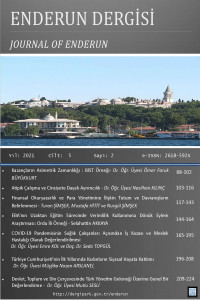Öz
Bu çalışma, Borsa İstanbul'da işlem gören firmaların 2012-2019 (dahil) yılları arasında kazanç özelliklerinin asimetrik zamanlılığını incelenmiştir. Çalışma neticelerine göre, negatif ekonomik olaylar, örneklem dönemi içinde, pozitif ekonomik olaylardan daha hızlı bir şekilde kazançlarda yansıtılmaktadır. Bu, BİST firmalarının finansal raporlama özelliklerinde kazançların asimetrik zamanlamasının hâkim bir uygulama olduğunu göstermektedir. Kazançların asimetrik zamanlılığının varlığı finansal raporlama literatüründe kazanç kalite kriterlerinden biri olarak ele alındığı göz önüne alındığında, borsada işlem gören Türk firmalarının kazanç kalitesinin bu kritere göre yüksek olduğu söylenebilir. Ayrıca, bulgular, firma büyüklüğü, finansal kaldıraç ve öz kaynakların piyasa değerinin defter değerine oranı gibi firmaya özgü faktörlerin kontrol edilmesine karşı da güçlüdür.
Anahtar Kelimeler
Kaynakça
- Ahmed, A. S., Billings, B. K., Morton, R. M. & Stanford-Harris, M. (2002), The Role of Accounting Conservatism in Mitigating Bondholder–Shareholder Conflicts Over Dividend Policy And in Reducing Debt Costs. Accounting Review, 77, 867–890.
- Ball, R., Robin, A. & Sadka, G. (2008), Is Financial Reporting Shaped by Equity Markets or by Debt Markets? An International Study of Timeliness and Conservatism. Review of Accounting Studies, 13, 168–205.
- Basu, S. (1997), The Conservatism Principle and The Asymmetric Timeliness of Earnings. Journal of Accounting and Economics, 24, 7-37.
- Basu, S. (2009), Conservatism Research: Historical Development and Future Prospects. China Journal of Accounting Research, 2, 1-20.
- Barker, R. (2015), Conservatism, Prudence and the IASB's Conceptual Framework. Accounting and Business Research, 45, 514-538.
- Beaver, W. H. & Ryan, S. G. (2005), Conditional and Unconditional Conservatism: Concepts and Modelling. Review of Accounting Studies, 10, 269-30.
- Bliss, J. H. (1924), Management through accounts. New York, The Ronald Press Co.
- Bushman, M. R., & Piotroski, J. D. (2006), Financial Reporting Incentives for Conservative Accounting: The influence of Legal and Political Institutions. Journal of Accounting and Economics, 42, 107-148.
- Financial Accounting Standards Board (FASB), (1975), Accounting for Contingencies, Statement of Financial Accounting Standards No. 5, FASB, Norwalk, CT.
- Frankel, R. M. & Roychowdhury, S. (2008), Are All Special Items Equally Special? The Predictive Role of Conservatism. Social Science Research Network, [Available at]: https://ssrn.com/abstract=1001434
- International Financial Reporting Standards - IFRS (2001), IAS 2 Inventories, [Available at]: http://eifrs.ifrs.org/eifrs/bnstandards/en/IAS2.pdf
- Jensen, M.C. & Meckling, W.H. (1976), Theory of the Firm: Managerial Behavior, Agency Costs and Ownership Structure. Journal of Financial Economics, 3, 305–60.
- La Fond, R. & Watts, R. L. (2008), The Information Role of Conservatism. The Accounting Review, 83, 447-478.
- Lawrence, A., Sloan, R. & Sun, Y. (2013), Non-Discretionary Conservatism: Evidence and Implications. Journal of Accounting and Economics, 56, 112-133.
- Maciuca, G., Hlaciuc, E. & Ursache, A. (2015), The Role Of Prudence in Financial Reporting: IFRS versus Directive 34. Procedia Economics and Finance, 32, 738 - 744.
- Patatoukas, P. N., (2016), Asymmetrically Timely Loss Recognition and the Accrual Anomaly. Discussion of Konstantinidi et al. ABACUS, 52, 166-175.
- Roychowdhury, S. & Watts, R. L. (2007), Asymmetric Timeliness of Earnings, Market-To-Book and Conservatism in Financial Reporting. Journal of Accounting and Economics, 44, 2-31.
- Ruch, G. W. & Taylor, G. (2015), Accounting Conservatism: A Review of the Literature. Journal of Accounting Literature, 34, 17-38.
- Scott, W.R. (2012), Financial Accounting Theory, Prentice-Hall, Toronto.
- Smith, C.J. & Watts, R.L. (1992), The Investment Opportunity Set and Corporate Financing, Dividend, and Compensation Policies. Journal of Financial Economics, 32, 263–92.
- Watts, R.L. (2003a), Conservatism in Accounting Part I: Explanations and Implications. Accounting Horizons, 17, 207–221.
- Watts, R.L. (2003b), Conservatism in Accounting Part II: Evidence and Research Opportunities. Accounting Horizons, 17, 287–301.
- Wyatt, A., Matolcsy, Z. & Stokes, D. (2001), Capitalisation of Intangibles – a Review of Current Practice and the Regulatory Framework. Australian Accounting Review, 11, 22–38.
- Zhang, J. (2008), The Contracting Benefits of Accounting Conservatism to Lenders and Borrowers. Journal of Accounting and Economics, 45, 27–54.
Ayrıntılar
| Birincil Dil | Türkçe |
|---|---|
| Bölüm | Makaleler |
| Yazarlar | |
| Yayımlanma Tarihi | 13 Ekim 2021 |
| Kabul Tarihi | 1 Haziran 2021 |
| Yayımlandığı Sayı | Yıl 2021 Cilt: 5 Sayı: 2 |


